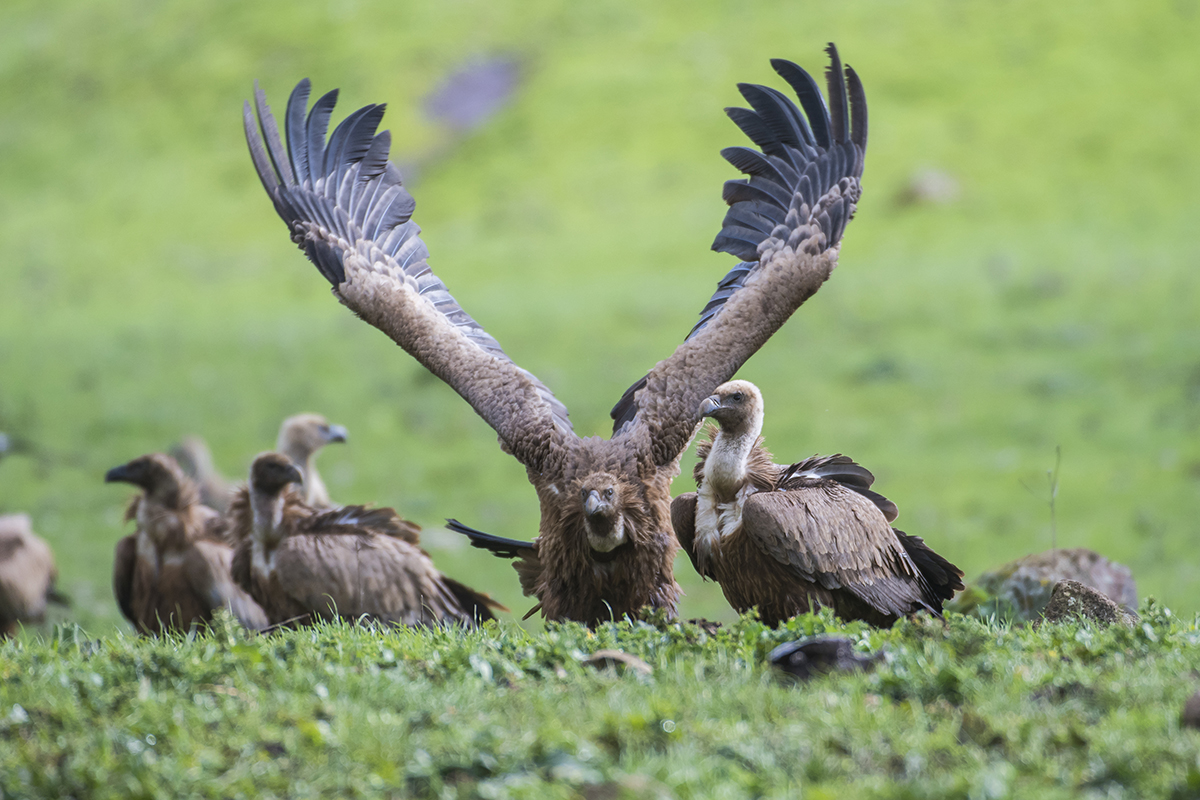There seems to be a ray of hope for Egyptian Vultures in Italy. Two of the species have settled at the Porto Conte in Sardinia for the past two months. Given that there are no Egyptian Vultures breeding in Sardinia and there are only 10-13 pairs of these species known around Italy in Sicily, Calabria and Basilicata – this is excellent news!
The positive news
This significant development happened thanks to the success of LIFE Under Griffon Wings, a repopulation project that raises awareness and informs conservation efforts that help protect and restore the Griffon Vulture population of the area.
An essential part of the project is to provide farm feeding stations for the Griffon Vultures, and in addition to the expected visits from crows, there were some unexpected visitors recently – two Egyptian Vultures. The camera traps recorded continuously the presence of the two new vultures feeding alongside the other birds for the past two months. Furthermore, conservationists frequently observed and monitored the birds to confirm the news and have taken a series of measures to minimise human disturbance in the area to make sure this is a suitable environment in hope for the vultures to stay.
The two Egyptian Vultures at a farm feeding station in Porto Conte
What actions led to this outcome?
The news show that the measures adopted for the protection of vultures by the LIFE Under Griffon Wings team have favoured positive effects on the whole community of scavenging birds. In particular, the feeding stations established, and the cooperation among various stakeholders effectively mitigated food shortages and increased the attractiveness of Sardinia for vultures. The project also reduced the human presence and disturbance, improving the park conditions for the vultures. A way they mitigated disturbance was by creating observation stations at Porto Conte to allow park visitors to observe the Griffon Vultures without producing a negative impact as well as informed an ethical photography code of contact to respect nesting sites. These actions resulted in the presence of the two Egyptian Vultures as well as the three territorial Griffon Vulture pairs where two of those nesting pairs had not been recorded in several years.
Griffons Vultures in Sardinia

Distributed over the whole island up to the late 1940s with an estimated population of 800 – 1200 individuals, the population of Griffon vultures in Sardinia dropped rapidly after the Second World War until the outlawing of poisoned baits in 1977. Now the species is restricted to the north-western part of the island and during a 2018 survey saw the population increase from the survey carried out in 2017 and consists of 50 territorial pairs, 37 breeding pairs and over 130 individuals.
LIFE Under Griffon Wings
Led by Sassari University, the LIFE Under Griffon Wings project aims to improve the conservation status of Griffon Vultures. Their conservation efforts include improving food availability and establishing a network of farm feeding stations that are managed by the livestock breeders themselves. Furthermore, forming an anti-poison dog unit and developing communication actions to raise awareness on the threat caused by the illegal use of poisoned baits as well as carrying out an extensive restocking programme to enhance the small population by translocating between 45 and 60 birds from wildlife rehabilitation centres in Spain to Sardinia.
The Vulture Conservation Foundation supports this important conservation project which was developed by the University of Sassari in partnership with the Municipality of Bosa, the Forestry Agency and the Corpo Forestale di Vigilanza Ambientale. The project is implemented in collaboration with the regional Departments of Environmental Protection and Health, the Regional Natural Park of Porto Conte, the Instituto Zooprofilattico Sperimentale of Sardinia.




